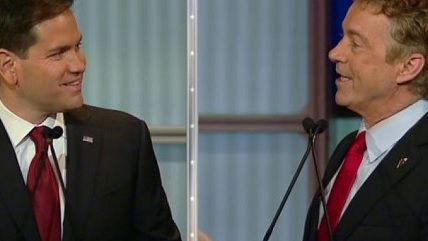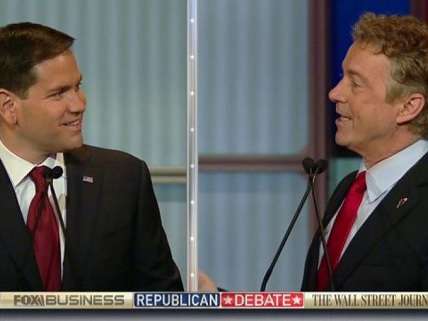Rand Paul is Not an Isolationist
Rubio's mischaracterization may have been a good applause line but it's the kind of lack of thinking sinking Republicans.


Sen. Marco Rubio's big winning line at yesterday's Republican debate was apparently when he called Sen. Rand Paul (R-Ky.) not just an isolationist but a committed isolationist. Bam! In an election cycle that often feels like a parade of low points for the Republican (and Democratic) parties, Rubio's characterization of Paul's foreign policy beliefs certainly seems to fit.
Did Rand Paul demand the U.S. withdraw from all the nearly 150 countries where the U.S. acknowledges it has active duty troops, as his father, Ron Paul, did? Did he demand the U.S. build walls at the borders and dot the coastlines with mines? Did he say fighting ISIS was none of America's business?
No, it was none of those things. Here's what Paul said that got Rubio calling him a commited isolationist:
"How is it conservative to add a trillion dollar expenditure for the federal government that you're not paying for? How is it conservative? How is it conservative to add a trillion dollars in military expenditures? You cannot be a conservative if you're going to keep promoting new programs you're not going to pay for."
Rubio's response isn't much better than a schoolyard "I know you are, but what am I?" It plays on the inaccurate image low-info voters (which is most voters) have of Rand Paul, based on years of establishment Republicans trying to connect his policy positions to those of his far more radical father, former Texas Rep. Ron Paul.
It's notable, too, that that radicalism—clear calls for the U.S. to pull its military from places it doesn't belong, to stop trying to play the "great game" and instead offer the opportunity for peaceful relations and free trade with all country, to end all foreign aid and not just foreign aid to countries nobody particularly likes—got Ron Paul pretty far in the 2012 election cycle, much further than it had in 2008.
Such a message could resonate even further in 2016, perhaps especially if it's tempered in the way Rand Paul has tried to do. It's a balancing act for sure, one Paul hasn't done so well with so far. Part of the blame lies with the Paul campaign's own uncertainty about where they stand, ideologically, on foreign policy. Paul has generally supported non-intervention or, more accurately, generally understood and articulated how U.S. interventionist policies have contributed to instability in the Middle East and beyond. Then he'll do something like suggest the U.S. send arms to the Kurds and redraw maps for them. In his effort to appeal to non-interventionist and interventionist types alike, Paul risked losing support among both (if he even had any of the latter).
But part of the blame, too, lies with other Republicans who have willfully misrepresented Paul's positions, of which Rubio is only the most recent example. Rand Paul is the only candidate, to my knowledge, on either side of the aisle, who has called for an end to the 14-year-long Afghanistan War. Most Americans continue to say the war was not worth fighting, even as some recent polls show majority support for extending the war. While that's disturbing, it shouldn't be surprising given the dearth of anti-war arguments in mainstream politics. It doesn't have to be that way.
Ron Paul energized a generation of youth in large part because of his anti-war sentiments, helping to send Republicans to Congress like Thomas Massie of Kentucky and Justin Amash of Michigan who fairly consistently articulate the need for non-interventionism. It's important work to build on, and has the opportunity to expand the pool of potential Republican voters. Instead, Republicans have spent this election cycle doing their best to shrink the pool of potential Republican voters. How much further they can shrink it depends on how many debates are left and who gets to speak at them.
Read Jacob Sullum on the Paul-Rubio spat and the truth about U.S. military spending.


Show Comments (84)